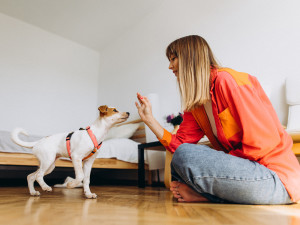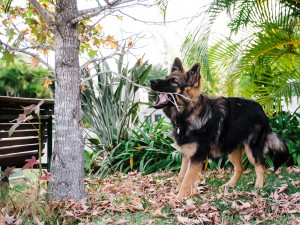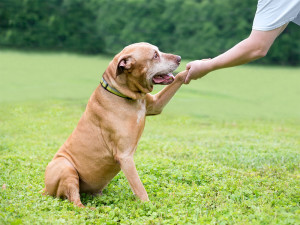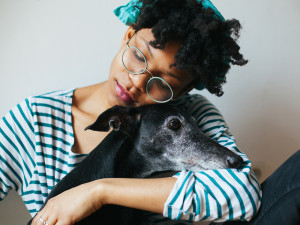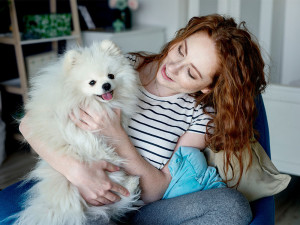When Is a Dog Considered an Adult?
In your eyes, never. But here’s the expert opinion.
In This Article:
At What Age is a Dog Considered an Adult? Developmental Stages of Dogs When is a Dog Fully Mature? Signs Your Dog is Reaching Maturity Does Spaying or Neutering Affect a Dog’s Growth? Implications of Dog Adulthood Frequently Asked Questions
Dogs achieve many milestones while growing up, from potty training, to leash walking, to their first car ride. But when does a naive puppy officially become an adult? Maturity in dogs involves both physical and behavioral changes, and the age this happens varies by breed. Here’s how to tell when your pup is becoming a grown up.
Snap a pic of your pup’s teeth, and GREENIES™ will help you spot potential signs of oral health issues.
At what age is a dog considered an adult?
A puppy is generally considered an adult dog between 12 to 18 months of age, but this timeframe can vary depending on the breed. Reaching adulthood can be determined by crossing a combination of physical and behavioral milestones. In general, smaller dogs tend to reach adulthood earlier than large breed dogs.
How much do you spend on your pet per year?
Developmental stages of dogs
Dogs go through multiple developmental stages. While some pass more quickly than others, they’re all vital to a dog’s physical and social development.
Puppy stage
Early puppyhood typically occurs from day one until six months of age. During this stage, puppies go from being dependent on their mother to encountering a myriad of “firsts” that they learn to handle on their own.
Puppyhood can be divided into even smaller periods: neonate, transitional, socialization, and juvenile. As neonates, puppies are completely dependent on their mother for food, warmth, and immunity. Puppies start to pee, poop, and eat solid foods during the transitional phase.
During the socialization period, puppies need lots of positive reinforcement to teach them how to interact with people, places, and other pets. The juvenile period is when routines and training should be a constant focus.
Adolescence stage
The adolescence stageopens in new tab can be considered a dog’s “teen years.” It occurs in the ages of six to 18 months depending on breed. During this stage, puppies will undergo puberty and experience rapid bone growth. Large and giant breed dogs have an extended adolescent stage with regards to bone growth.
Adult stage
Adulthood in dogs starts as early as 12 months and as late as 24 months, and it lasts until around an age of eight years. This is when dogs are at their physical prime. They are able to enjoy their favorite physical activities with a lower risk of injury.
Adult dogs have also settled into their personalities, including their loveable quirks and irritating habits. Continued training is important though — adult dogs can still learn and thrive with mental stimulation.
Proper nurturing in these years can greatly impact a dog’s longevity. Things like feeding a balanced diet, maintaining a healthy weight, providing physical activity, and pursuing routine veterinary care can pay off in the long run.
Senior stage
On average, dogs are considered senior when they are eight years old. This is the standard age to start making tweaks to routine care to catch age-related changes early. This may include doing checkups every six months instead of annually or performing senior blood work every six to 12 months.
Dogs reach the senior stage of life at different times depending on breed and size. In general, the larger the dog, the shorter the lifespan and the earlier it will be considered a senior. For example, a six year old Mastiff or Great Dane will be considered to be senior, while a six year old Yorkie or Beagle may be in the middle of adulthood and not experiencing any of the expected changes associated with aging.
A dog in its golden years is likely to develop health issues associated with aging or degeneration like arthritis, chronic kidney disease, neurological issues, or cancer.
When is a dog fully mature?
A puppy doesn’t wake up one day magically looking, feeling, and acting like a mature, grown up dog. Maturity happens after reaching different life milestones:
Physical maturity
Dogs are physically mature when they have completed their bone growth. For most dogs, this is between 12 to 18 months of age, though giant breed dogs can continue growing until they’re 24 months old. Dogs may still fill out a little bit after completing bone development due to gaining fat and muscle mass.
Dentition is another physical milestone. Dogs have all of their adult teeth by the time they’re six to seven months old, but this is not typically used as a marker of maturity because of how early it occurs.
Emotional maturity
Older dogs have the benefit of experience to help them interact with their surroundings in a positive way. With time and age, dogs tend to learn to cope with new people, places, and situations. Not every dog outgrows separation anxiety, but many learn from having a consistent routine that their family will return after school or work.
Sexual maturity
Dogs go through puberty as early as six months and as late as 24 months (the smaller the dog, the earlier it’s likely to happen). Sexual maturity results in hormonal and behavioral changes like descending testicles, first heat cycle, marking, and humping.
Signs your dog is reaching maturity
When you see your pup everyday, it can be difficult to notice the gradual changes associated with growing up. Here are some signs that your puppy is becoming an adult dog:
All their adult teeth have erupted.
Accidents in the house are a thing of the past.
They’re less destructive and don’t see everything as a chew toy.
They're showing signs of sexual maturity.
They pick up on social cues from other pets and people.
Their movements are more coordinated and no longer seem clumsy.
They start to gain muscle mass and look less gangly.
They follow training cues like a pro.
Does spaying or neutering affect a dog’s growth?
Some studies have shown that spaying and neutering can affect a dog’s growth, especially if it occurs before puberty. The sex hormones associated with puberty stimulate the growth plates to close. So, spaying or neutering early (before puberty and while growth plates are still open) can cause delayed growth plate closure, resulting in longer bones (or taller dogs).
For smaller dogs, the increased growth seen with early spay/neuter can be pretty negligible. In large and giant breed dogs, however, it can play a significant role in determining the best age to pursue spaying/neutering. There is a concern that early spaying and neutering increases the risk for orthopedic issues in large- and giant-breed dogs.
When you are adopting, some shelters or rescues require pups to be spayed or neutered before you can bring them home; some will ask for a deposit to guarantee that you will get the procedure taken care of. Speak to your vet and the rescue about how to handle this for your dog.
Implications of dog adulthood
When a puppy becomes an adult, needs and expectations also change. With adulthood comes, changes to what a dog needs in terms of diet, routines, and training. Knowing what to expect can make the transition smoother.
Nutritional needs
Puppies have different nutritional requirements than adult dogs, and puppy foods reflect that. Puppy food is higher in calcium, phosphorus, protein, fat, and fatty acids — all the ingredients needed to support bone growth, brain development, and overall health. Puppy food is also calorie-dense to account for all of the energy a puppy burns while growing and playing.
Adjustments can be made based on breed and lifestyle. For example, large and giant breed puppies continue to have bone growth until they’re around 24 months old. Nutrition for these pups should focus on supporting slow and steady growth, because rapid bone growth can lead to orthopedic issues, like hip dysplasia, elbow dysplasia, or panosteitis (an inflammatory bone disease). These dogs may benefit from a diet that’s labeled “for all life stages” rather than “growth.” Puppy parents should consult with their vet to determine the best type of food to feed and when to transition to adult food.
Puppy parents should follow the nutritional requirements for their dog’s age, breed, and lifestyle to avoid negative consequences. Feeding adult food to a puppy can lead to poor growth and nutritional deficiencies. On the other hand, feeding puppy food to an adult dog can lead to obesity and organ disease due to excessive amounts of certain vitamins and minerals.
Exercise and activity levels
Every dog needs daily exercise, regardless of age. As dogs age, that exercise may look more like a leisurely stroll than an hour-long hike. When a dog goes from puppyhood to adulthood, they may benefit from having exercise worked into their routine, like daily walks, playing fetch, or weekend swim sessions.
Behavioral differences
Maturity comes with the ability to better regulate emotions and behavior. Adult dogs may be better able to approach new situations with composure instead of extreme reactions, so their behavior becomes more predictable. The socialization period of puppyhood is a super important factor in how a dog responds to their environment. Receiving lots of positive reinforcement helps dogs approach strange experiences with curiosity instead of fear.
Adult dogs also (fingers crossed) tend to be less destructive than puppies, so the need to constantly puppy-proof your home may fall away. Though training never stops, day-to-day activities become less focused on teaching and more about enjoying each other's company.
Bottom line
A puppy becomes an adult between 12 and 18 months of age, depending on breed and size. Adulthood is marked by the completion of physical growth, puberty, and emotional maturity. During this transition, a dog’s nutritional and behavioral needs evolve, requiring adjustments in care to make sure they grow up healthy and strong.
FAQs
Is a two-year-old dog still a puppy?
Because large and giant breed puppies do not reach physical maturity until 18 to 24 months of age, a two-year-old giant breed dog can still be considered a puppy if they’re still growing.
How can you tell if your dog is emotionally mature?
A sign that your dog is emotionally mature is that their behavior is predictable during both familiar and new situations.
When does puppy energy go away?
Puppies tend to slow down once they reach 12 months of age. This can happen earlier in small breeds and later in large breeds. Some dogs never outgrow the zoomies though.
When should you switch my dog to adult food?
The timing to switch a puppy to adult food varies by size and breed — around nine months for small dogs, 12 months for medium dogs, and 18 months for large breed dogs.
How long does dog adolescence last?
Puppy adolescence occurs between ages six to 18 months. It can be one of the more difficult life stages because a pup’s behavior may be influenced by rebellion or puberty.
References
Fox, Amy. “How Can You Tell How Old a Dog Is?” Kinship.com, 2025, www.kinship.com/dog-health/how-can-you-tell-how-old-a-dog-isopens in new tab. Accessed 29 Oct. 2025.
“Feeding Large and Giant Breed Puppies | Purina Institute.” Purina Institute, 2017, www.purinainstitute.com/centresquare/life-stage-nutrition/feeding-large-and-giant-breed-puppiesopens in new tab.
“The Journey of a Lifetime: Understanding Your Dog’s Life Stages.” AAHA, 6 Aug. 2024, www.aaha.org/resources/the-journey-of-a-lifetime-understanding-your-dogs-life-stages/opens in new tab.
Salmeri, K R et al. “Gonadectomy in immature dogs: effects on skeletal, physical, and behavioral development.” Journal of the American Veterinary Medical Association vol. 198,7 (1991): 1193-203.



